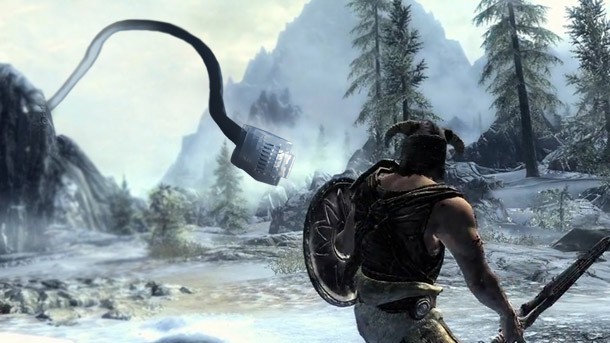Please support Game Informer. Print magazine subscriptions are less than $2 per issue
Editorial: Gaming, Skyrim, And The Digital Have-Nots

A few weeks ago, I received an email from a longtime Game Informer reader asking about Skyrim. Usually, when I receive such emails from readers, they are asking me my opinion on a game – or complaining that I scored a certain game too low or too high. In this case, the reader was already sold on Skyrim. However, there was a problem. The reader lived in the South, in a remote area where he did not have access to broadband Internet service. He told me that he misses out on a lot of what makes up the experience of being a gamer in 2011. Given his lack of broadband access, multiplayer and DLC is out of the question – unless the DLC later comes packaged on disc (he cited his past purchases of games like Red Dead Redemption: Undead Nightmare Collection and the Game of the Year Editions of Oblivion and Fallout 3, which both included past DLC on disc).
As a PS3 owner, he’d read about the myriad bugs and technical issues that have plagued that version of Skyrim. Obviously, with no broadband, it’s not possible for him to download any of the post-release patches that Bethesda has instituted to try to fix the problems. His question was simple: Should he take a chance on buying Skyrim on PS3 now, or hope that an eventual Game of the Year Edition comes out sometime next year with some DLC and (hopefully) many of the bug fixes already implemented.
Sadly, I didn’t have a good answer. I told him, based on what I’ve heard and read (I’m playing Skyrim on 360), that I would roll the dice that a better, Game of the Year edition would eventually be released. Still, it’s sad to me that there are gamers eager to play a game like Skyrim who aren’t able to because of a lack of Internet access.
It made me think about the age we are living in, and how there’s a good portion of the gaming community that’s effectively being shut out. As anyone knows, post-release (and even release day) patches are becoming the norm in this industry. It seems like nearly every game I play starts not with an amazing opening sequence, but 10 minutes of downloading updates. Factor in the inability to play multiplayer online and download DLC for games, and you have a significant portion of the gaming community that’s not getting the most for the $60 they spent on a game.
How many? It’s hard to put an accurate number on it, but by any measure it’s much greater than you might assume. In 2010, a survey of over 100,000 American estimated that 40 percent of the U.S. has no broadband access. Even on Xbox 360, a console that’s placed a premium on pushing its online Xbox Live service, a gap remains. According to a recent earnings report, Microsoft has sold 57.6 million Xbox 360s worldwide. But, in 2010, Xbox Live chief Marc Whitten revealed that Xbox Live only has 23 million members. I’m sure that in the year gap between those figures, Live gained some members, but my point remains.
Losing out on online play and vital patches is bad enough, but with the recent trend of locking out content in a game that can be redeemed with online passes, things could get worse for offline gamers. For example, in Rocksteady’s Batman: Arkham City, the Catwoman single-player missions can only be redeemed by inputting an online code. No Internet, no Catwoman. This tactic will only grow in years to come – and I don’t know where that leaves gamers who aren’t able to access online services.
I wish that I could suggest a clever solution to this problem. I can’t. Digital distribution is a big part of this industry’s future, and being online will be increasingly necessary to taking part in this hobby. At the very least, I would challenge developers and publishers to ensure that they release launch-day code that is playable without multiple patches (I’m not holding my breath on that one). Let’s hope the U.S. invests heavily in broadband infrastructure, to ensure that all Americans have an equal chance in taking part in the online economy (Not holding my breath on that one, either). The new possibilities that the Internet has opened up for gamers are amazing, but it might be worth taking a second to look at who’s being left behind.










